Unit 11 Rules Matter! Wrapping up the topic Review课件(共47张PPT,含内嵌视频)
文档属性
| 名称 | Unit 11 Rules Matter! Wrapping up the topic Review课件(共47张PPT,含内嵌视频) | 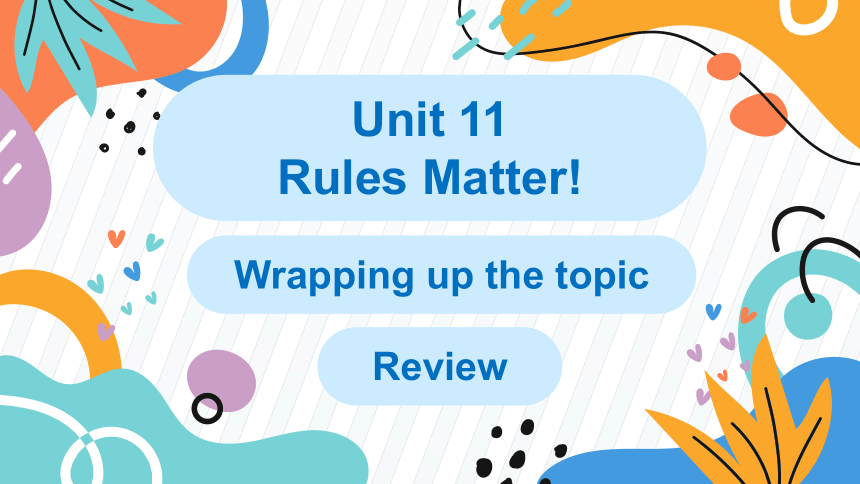 | |
| 格式 | pptx | ||
| 文件大小 | 124.9MB | ||
| 资源类型 | 教案 | ||
| 版本资源 | 仁爱科普版 | ||
| 科目 | 英语 | ||
| 更新时间 | 2025-06-13 19:12:17 | ||
图片预览

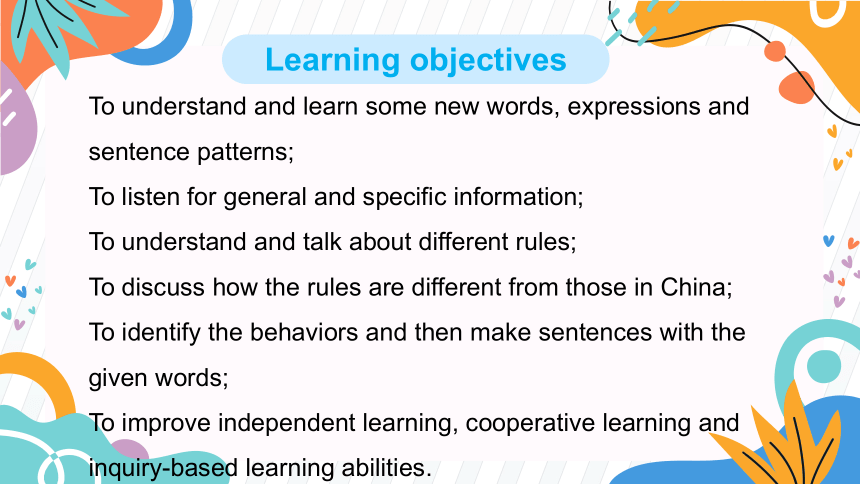
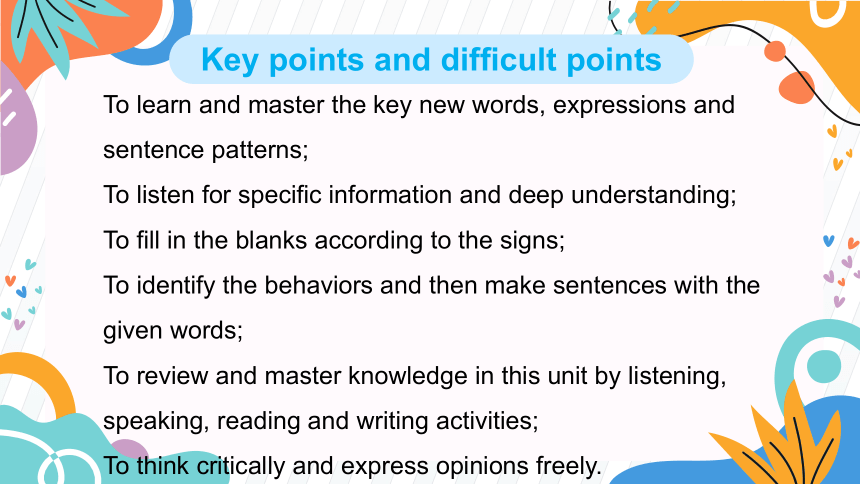

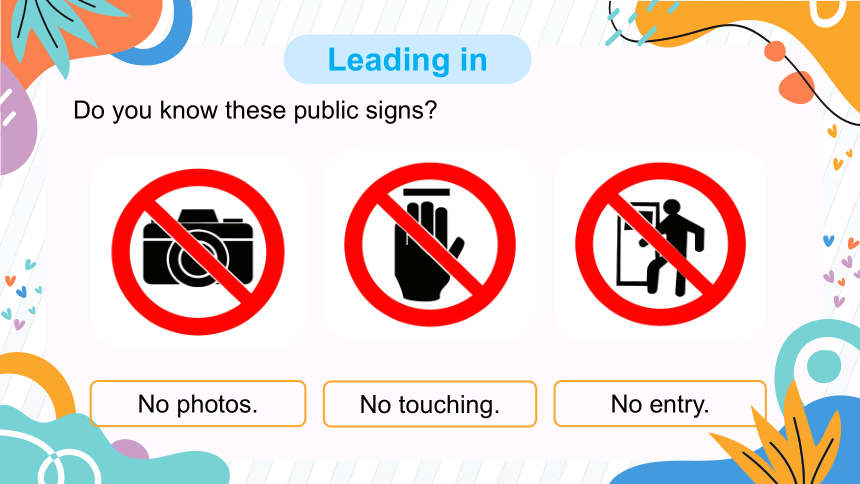
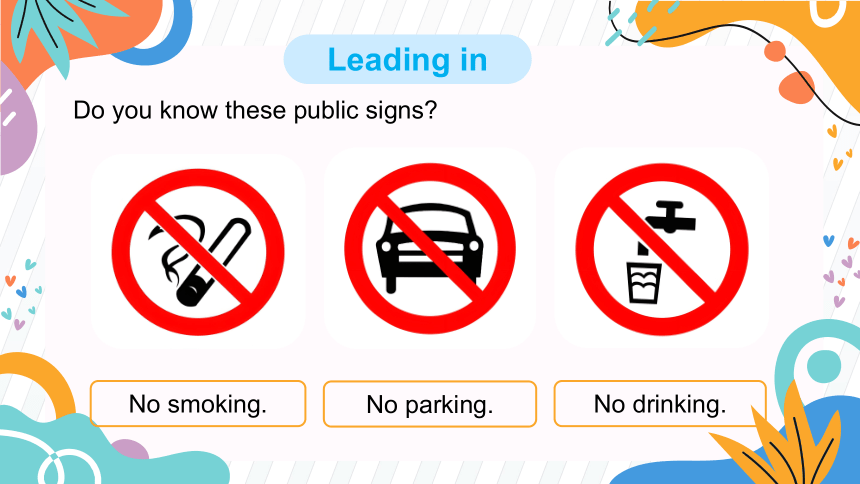
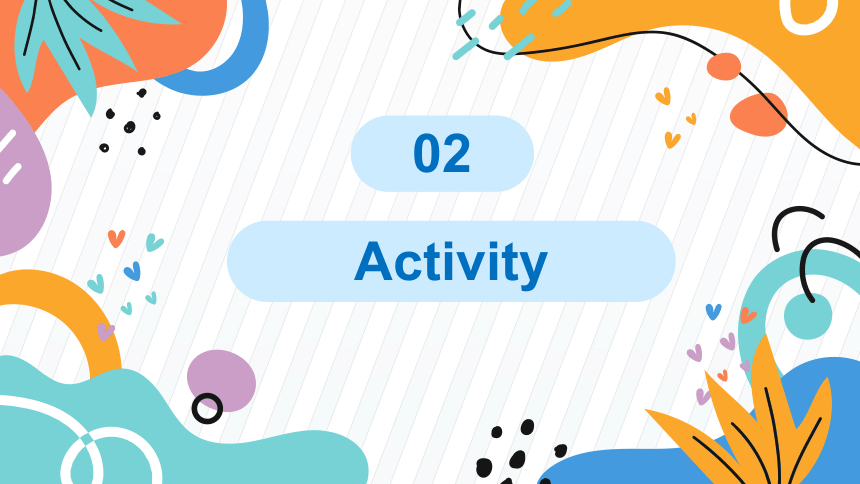
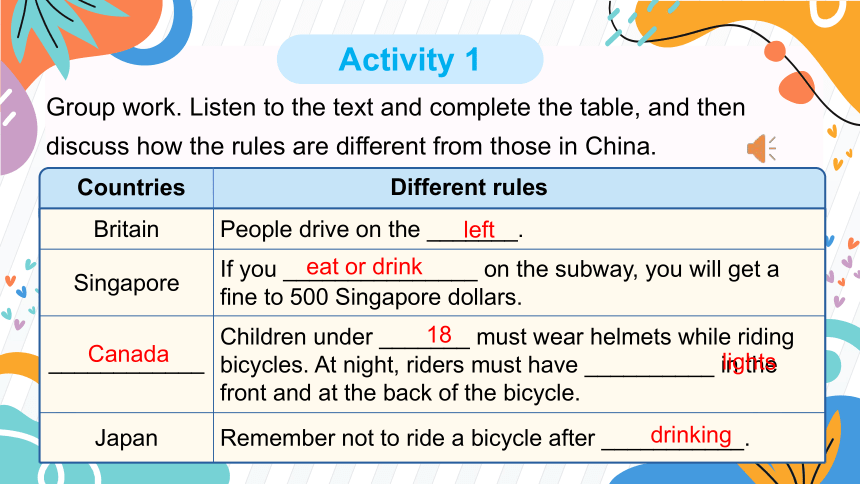

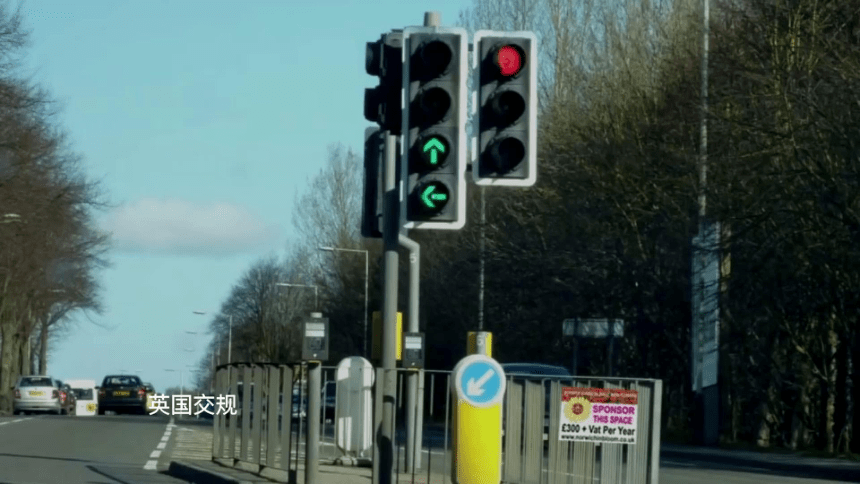

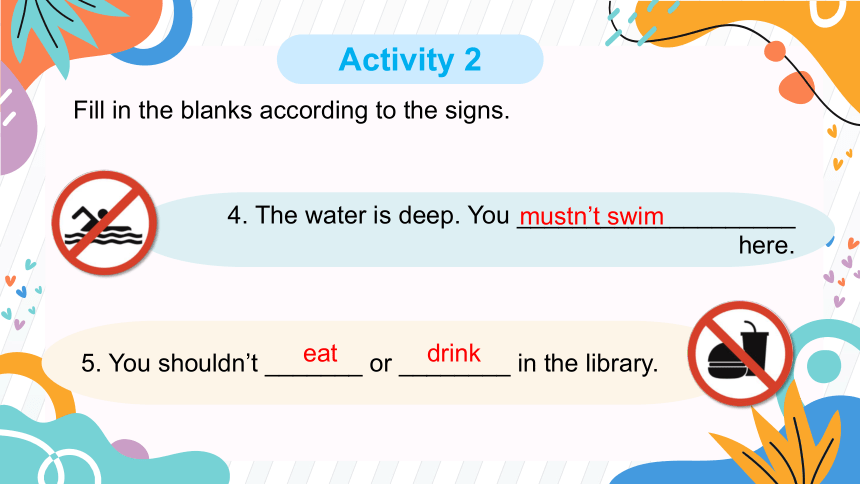
文档简介
(共47张PPT)
Wrapping up the topic
Review
Unit 11
Rules Matter!
Learning objectives
To understand and learn some new words, expressions and sentence patterns;
To listen for general and specific information;
To understand and talk about different rules;
To discuss how the rules are different from those in China;
To identify the behaviors and then make sentences with the given words;
To improve independent learning, cooperative learning and inquiry-based learning abilities.
Key points and difficult points
To learn and master the key new words, expressions and sentence patterns;
To listen for specific information and deep understanding;
To fill in the blanks according to the signs;
To identify the behaviors and then make sentences with the given words;
To review and master knowledge in this unit by listening, speaking, reading and writing activities;
To think critically and express opinions freely.
Leading in
01
Do you know these public signs
Leading in
No photos.
No touching.
No entry.
Do you know these public signs
Leading in
No smoking.
No parking.
No drinking.
Activity
02
Group work. Listen to the text and complete the table, and then discuss how the rules are different from those in China.
Activity 1
Britain People drive on the _______.
Singapore If you _______________ on the subway, you will get a fine to 500 Singapore dollars.
____________ Children under _______ must wear helmets while riding bicycles. At night, riders must have __________ in the front and at the back of the bicycle.
Japan Remember not to ride a bicycle after ___________.
Countries
Different rules
left
eat or drink
18
Canada
lights
drinking
Read the text aloud.
Activity 1
Welcome to our program. Today l'm going to talk about different traffic rules in the world.
1. In Britain, people drive on the left.
2. People mustn't eat or drink on the subway in Singapore. When you do so, you will get a fine up to 500 Singapore dollars.
3. Children under 18 must wear helmets while riding bicycles in Canada. At night, every rider must have lights in the front and at the back of the bicycle.
4. Remember not to ride a bike after drinking in Japan.
Thanks for listening.
Fill in the blanks according to the signs.
Activity 2
1. Please __________ in the cinema.
2. You’re driving too fast! You should ____________.
3. During the meeting, we mustn’t chat. We should __________ carefully.
be quiet
drive slowly
listen
Fill in the blanks according to the signs.
Activity 2
4. The water is deep. You ____________________ here.
5. You shouldn’t _______ or ________ in the library.
mustn’t swim
eat
drink
Look at the pictures. Put a check (√) for must /should or a cross (×) for mustn’t /shouldn’t, and then make sentences with the given words.
Activity 3
1. (we, be late for, school)
________________________________________________
2. (Jack, eat, classroom)
________________________________________________
We shouldn’t be late for school.
Jack shouldn’t eat in the classroom.
×
×
Activity 3
3. (I, do homework, every day)
____________________________ ____________________________
4. (Lingling, keep...clean, her bedroom)
______________________________________________________________
I should/must do homework every day.
Lingling should keep her bedroom clean.
√
√
Look at the pictures. Put a check (√) for must /should or a cross (×) for mustn’t /shouldn’t, and then make sentences with the given words.
Activity 3
5. (my uncle, feed, dog, every day)
____________________________________________________
6. (Mr. Li, stay up, too late)
________________________________________________
My uncle should feed the dog every day.
Mr. Li shouldn’t stay up too late.
√
×
Look at the pictures. Put a check (√) for must /should or a cross (×) for mustn’t /shouldn’t, and then make sentences with the given words.
Read the text and complete the reading tasks.
Activity 4
We Chinese think of food as an important part of our lives. Here are some table manners in China.
Taking the Right Seat
There is usually a “Best Seat” for the most important person and a right seat for everyone. So, don’t sit in the wrong seat.
Read the text and complete the reading tasks.
Activity 4
Eating—Important Rules to Learn
Always wait for the elders or others to try the dishes first.
Don’t put too much food on your own plate.
Using Chopsticks
People must not put chopsticks in rice.
Do not make a noise with chopsticks.
Never point at people with chopsticks.
Read the text and complete the reading tasks.
Activity 4
Table manners in China.
The most important person.
Always wait for the elders or others to try the dishes first.
1. Give the text a good title.
2. Who takes the “Best Seat”
3. What are good eating manners
Read the text and complete the reading tasks.
Activity 4
4. Put a check (√) for good manners and a cross (×) for bad manners.
×
( )
( )
( )
( )
√
×
×
Learning skills
03
Learning skills
看图技巧
本板块重点强化了通过看图来理解图片内容并推断图片所表达信息的能力。那么如何有效地看图并获取信息呢
英语学习中看图查找信息的方法主要包括观察图片、提炼信息、阅读文字、整合信息以及回答问题。
1. 观察图片
首先,需要仔细观察图片,分析图片中的人物、动作、环境等要素。通过观察图片可以获取一些关键信息,为后续的阅读做准备。
Learning skills
2. 提炼信息
观察图片之后,学生需要对图片中的关键信息进行提炼。可以通过列出关键词、短语或句子的方式,提取出图片所要传达的信息。
3. 阅读文字
部分图片会配有文字,学生需要认真阅读与图片内容相关的文字。找到文字和图片之间的关联从而加强对图片的理解。
看图技巧
Learning skills
4. 整合信息
在阅读完文字之后,学生需要将图片中提取的信息与文章中获得的信息进行比较和整合,并理解两者之间的关系。这有助于学生更好地理解文章的主题和意图。
5. 回答问题
最后一步是根据对图片和文章的理解回答相关问题。这些问题可以在文章中找到,也可以由学生自己归纳、总结。
看图技巧
Vocabulary
04
Vocabulary
单词 词性 释义
subway n. 地铁
dollar n. 元(美国、加拿大、澳大利
亚等国的货币单位)
helmet n. 头盔
rider n. 骑手;骑马(或自行车、摩
托车)的人
meeting n. 会议;集会
manner n. 礼仪;礼貌(复数)
Vocabulary
单词 词性 释义
seat n. 座位
person n. 人;个人
wrong adj. 错误的;有毛病
plate n. 盘子;碟子
chopstick n. 筷子
point v. 指,指向
n. 论点;重点;点
Language points
05
Language points
1. If you eat or drink on the subway, you will get a fine up to 500 Singapore dollars.
(1)subway,名词,意为“地铁”,美式英语
① take the subway/by subway 乘地铁
② on the subway 在地铁上
Many people take the subway to work everyday.
= Many people go to work by subway every day.
许多人每天乘坐地铁去上班。
There are many people on the subway.
地铁上有很多人。
Language points
1. If you eat or drink on the subway, you will get a fine up to 500 Singapore dollars.
(2)fine在此处作名词,意为“罚款;罚金”
① get a fine 意为“被罚款”
lf you park your car in a wrong place, you'll get a fine. 如果你违章停车,你会被罚款。
② fine还可作动词,意为“对……处以罚款”
The police fined her 200 yuan for speeding.
因为超速,警察对她处以200元的罚款。
Language points
1. If you eat or drink on the subway, you will get a fine up to 500 Singapore dollars.
(3)fine 还可作形容词,意为“健康的;身体好的;晴朗的”
- How are you
你好吗
- I'm fine. Thank you.
我很好。谢谢。
I hope it stays fine for the picnic.
我希望野餐那天还是晴天。
Language points
2. We shouldn't be late for school.
(1)late在此处作形容词,意为“迟到的;晚的”;其反义词为early,意为“早的”,be late for 意为“迟到”
Xiaoli is often late for work.
小丽经常上班迟到。
(2)late 作形容词时还可意为“已故的”
People in China usually remember their late family members on Tomb-sweeping Day.
在中国,人们通常在清明节纪念他们已故的家人。
Language points
3. Mr. Li shouldn't stay up too late.
(1)stay up,动词短语,意为“熬夜”
Staying up late is bad for our health.
熬夜对我们的健康有害。
(2)stay 的相关短语
① stay healthy 保持健康
He often does exercise to stay healthy.
他经常锻炼来保持健康。
Language points
3. Mr. Li shouldn't stay up too late.
(2)stay 的相关短语
② stay away from 远离……
You should stay away from computer games.
你应该远离电脑游戏。
③ stay at home 待在家里
Li Ming likes staying at home alone.
李明喜欢独自待在家里。
Language points
4. We Chinese think of food as an important part of our lives.
think of...as...,动词短语,意为“把……当作……”。可与regard...as...互换,意为“把……视为;以……看待”
Many people think of/regard their pets as their family.
许多人把宠物当作他们的家人。
I regard him as my mentor and guide in life.
我把他视为我生活中的导师和引路人。
Language points
5. Take the right seat.
(1)seat,可数名词,意为“座位”
I'm afraid you sit in the wrong seat. lt's my seat.
恐怕你坐错了位置,这是我的位置。
(2)常用搭配
① take/have a seat 请坐
Take a seat, Wang Lin. l'll talk about your English learning with you.
请坐,王林,我将和你谈谈你的英语学习情况。
Language points
5. Take the right seat.
(2)常用搭配
② give a seat to sb. 给某人让座
give sb. a seat 给某人让座
It's good to give seats to children on the subway.
= It's good to give children seats on the subway.
在地铁上给小孩让座是好的。
He usually give a seat to the old.
他经常给老人让座。
Language points
5. Take the right seat.
(3)seat还可作动词,意为“向……提供座位;(使)就座;落座;坐”,一般和反身代词或被动结构连用
The mother seated her daughter on a bench.
这位妈妈把女儿放在一个长凳上坐下。
Please wait to be seated.
请等候安排入座。
He seated himself behind the desk.
他在书桌后面坐下。
Language points
6. There is usually a “Best Seat” for the most important person and a right seat for everyone.
(1)person,可数名词,意为“人;个人”
The two persons are new here, so they need some help.
这两个人是新来的,所以他们需要些帮助。
(2)personal,形容词,意为“个人的;私人的”
Don't tell others your personal information easily.
不要轻易地告诉他人你的个人信息。
Language points
7. Never point at people with chopsticks.
(1)point,动词,意为“指,指向”
point at...意为“指着……”
Wang Lin pointed at me with his fingers and shouted loudly.
王林用手指着我并生气地大吼。
lt's not polite to point at people with your fingers.
用手指人是不礼貌的。
Language points
7. Never point at people with chopsticks.
(2)point 还可作可数名词,意为“小数点;点;论点;观点;重点;见解”
l often listen to the radio programs on ninety nine point six (99.6) FM.
我经常在调频 99.6 听广播节目。
His special points made us very interested.
他特别的观点让我们很感兴趣。
Exercise
06
Exercise
1. 如果赶时间的话,你最好坐地铁。
You'd better ______________________ if you need to hurry.
2. 如果你违反交通规则,你就会受到处罚。
If you break the traffic rules, you will ___________________.
3. 再不走我们开会就要迟到了。
We'll __________________ the meeting if we stay any longer.
4. 您可以在那里坐一会。
You can __________________ over there for a moment.
take the subway
get a fine
be late for
take a seat
Summary
07
Summary
Learn and master some new words, expressions and sentence patterns;
Listen for general and specific information;
Understand and talk about different rules;
Discuss how the rules are different from those in China;
Identify the behaviors and then make sentences with the given words;
Fill in the blanks according to the signs;
Think critically and express opinions freely.
Homework
08
Homework
Must-do: Review the key words, expressions and sentence patterns in today’s lesson.
Choose-to-do: Talk about different rules in life.
Thank you
Wrapping up the topic
Review
Unit 11
Rules Matter!
Learning objectives
To understand and learn some new words, expressions and sentence patterns;
To listen for general and specific information;
To understand and talk about different rules;
To discuss how the rules are different from those in China;
To identify the behaviors and then make sentences with the given words;
To improve independent learning, cooperative learning and inquiry-based learning abilities.
Key points and difficult points
To learn and master the key new words, expressions and sentence patterns;
To listen for specific information and deep understanding;
To fill in the blanks according to the signs;
To identify the behaviors and then make sentences with the given words;
To review and master knowledge in this unit by listening, speaking, reading and writing activities;
To think critically and express opinions freely.
Leading in
01
Do you know these public signs
Leading in
No photos.
No touching.
No entry.
Do you know these public signs
Leading in
No smoking.
No parking.
No drinking.
Activity
02
Group work. Listen to the text and complete the table, and then discuss how the rules are different from those in China.
Activity 1
Britain People drive on the _______.
Singapore If you _______________ on the subway, you will get a fine to 500 Singapore dollars.
____________ Children under _______ must wear helmets while riding bicycles. At night, riders must have __________ in the front and at the back of the bicycle.
Japan Remember not to ride a bicycle after ___________.
Countries
Different rules
left
eat or drink
18
Canada
lights
drinking
Read the text aloud.
Activity 1
Welcome to our program. Today l'm going to talk about different traffic rules in the world.
1. In Britain, people drive on the left.
2. People mustn't eat or drink on the subway in Singapore. When you do so, you will get a fine up to 500 Singapore dollars.
3. Children under 18 must wear helmets while riding bicycles in Canada. At night, every rider must have lights in the front and at the back of the bicycle.
4. Remember not to ride a bike after drinking in Japan.
Thanks for listening.
Fill in the blanks according to the signs.
Activity 2
1. Please __________ in the cinema.
2. You’re driving too fast! You should ____________.
3. During the meeting, we mustn’t chat. We should __________ carefully.
be quiet
drive slowly
listen
Fill in the blanks according to the signs.
Activity 2
4. The water is deep. You ____________________ here.
5. You shouldn’t _______ or ________ in the library.
mustn’t swim
eat
drink
Look at the pictures. Put a check (√) for must /should or a cross (×) for mustn’t /shouldn’t, and then make sentences with the given words.
Activity 3
1. (we, be late for, school)
________________________________________________
2. (Jack, eat, classroom)
________________________________________________
We shouldn’t be late for school.
Jack shouldn’t eat in the classroom.
×
×
Activity 3
3. (I, do homework, every day)
____________________________ ____________________________
4. (Lingling, keep...clean, her bedroom)
______________________________________________________________
I should/must do homework every day.
Lingling should keep her bedroom clean.
√
√
Look at the pictures. Put a check (√) for must /should or a cross (×) for mustn’t /shouldn’t, and then make sentences with the given words.
Activity 3
5. (my uncle, feed, dog, every day)
____________________________________________________
6. (Mr. Li, stay up, too late)
________________________________________________
My uncle should feed the dog every day.
Mr. Li shouldn’t stay up too late.
√
×
Look at the pictures. Put a check (√) for must /should or a cross (×) for mustn’t /shouldn’t, and then make sentences with the given words.
Read the text and complete the reading tasks.
Activity 4
We Chinese think of food as an important part of our lives. Here are some table manners in China.
Taking the Right Seat
There is usually a “Best Seat” for the most important person and a right seat for everyone. So, don’t sit in the wrong seat.
Read the text and complete the reading tasks.
Activity 4
Eating—Important Rules to Learn
Always wait for the elders or others to try the dishes first.
Don’t put too much food on your own plate.
Using Chopsticks
People must not put chopsticks in rice.
Do not make a noise with chopsticks.
Never point at people with chopsticks.
Read the text and complete the reading tasks.
Activity 4
Table manners in China.
The most important person.
Always wait for the elders or others to try the dishes first.
1. Give the text a good title.
2. Who takes the “Best Seat”
3. What are good eating manners
Read the text and complete the reading tasks.
Activity 4
4. Put a check (√) for good manners and a cross (×) for bad manners.
×
( )
( )
( )
( )
√
×
×
Learning skills
03
Learning skills
看图技巧
本板块重点强化了通过看图来理解图片内容并推断图片所表达信息的能力。那么如何有效地看图并获取信息呢
英语学习中看图查找信息的方法主要包括观察图片、提炼信息、阅读文字、整合信息以及回答问题。
1. 观察图片
首先,需要仔细观察图片,分析图片中的人物、动作、环境等要素。通过观察图片可以获取一些关键信息,为后续的阅读做准备。
Learning skills
2. 提炼信息
观察图片之后,学生需要对图片中的关键信息进行提炼。可以通过列出关键词、短语或句子的方式,提取出图片所要传达的信息。
3. 阅读文字
部分图片会配有文字,学生需要认真阅读与图片内容相关的文字。找到文字和图片之间的关联从而加强对图片的理解。
看图技巧
Learning skills
4. 整合信息
在阅读完文字之后,学生需要将图片中提取的信息与文章中获得的信息进行比较和整合,并理解两者之间的关系。这有助于学生更好地理解文章的主题和意图。
5. 回答问题
最后一步是根据对图片和文章的理解回答相关问题。这些问题可以在文章中找到,也可以由学生自己归纳、总结。
看图技巧
Vocabulary
04
Vocabulary
单词 词性 释义
subway n. 地铁
dollar n. 元(美国、加拿大、澳大利
亚等国的货币单位)
helmet n. 头盔
rider n. 骑手;骑马(或自行车、摩
托车)的人
meeting n. 会议;集会
manner n. 礼仪;礼貌(复数)
Vocabulary
单词 词性 释义
seat n. 座位
person n. 人;个人
wrong adj. 错误的;有毛病
plate n. 盘子;碟子
chopstick n. 筷子
point v. 指,指向
n. 论点;重点;点
Language points
05
Language points
1. If you eat or drink on the subway, you will get a fine up to 500 Singapore dollars.
(1)subway,名词,意为“地铁”,美式英语
① take the subway/by subway 乘地铁
② on the subway 在地铁上
Many people take the subway to work everyday.
= Many people go to work by subway every day.
许多人每天乘坐地铁去上班。
There are many people on the subway.
地铁上有很多人。
Language points
1. If you eat or drink on the subway, you will get a fine up to 500 Singapore dollars.
(2)fine在此处作名词,意为“罚款;罚金”
① get a fine 意为“被罚款”
lf you park your car in a wrong place, you'll get a fine. 如果你违章停车,你会被罚款。
② fine还可作动词,意为“对……处以罚款”
The police fined her 200 yuan for speeding.
因为超速,警察对她处以200元的罚款。
Language points
1. If you eat or drink on the subway, you will get a fine up to 500 Singapore dollars.
(3)fine 还可作形容词,意为“健康的;身体好的;晴朗的”
- How are you
你好吗
- I'm fine. Thank you.
我很好。谢谢。
I hope it stays fine for the picnic.
我希望野餐那天还是晴天。
Language points
2. We shouldn't be late for school.
(1)late在此处作形容词,意为“迟到的;晚的”;其反义词为early,意为“早的”,be late for 意为“迟到”
Xiaoli is often late for work.
小丽经常上班迟到。
(2)late 作形容词时还可意为“已故的”
People in China usually remember their late family members on Tomb-sweeping Day.
在中国,人们通常在清明节纪念他们已故的家人。
Language points
3. Mr. Li shouldn't stay up too late.
(1)stay up,动词短语,意为“熬夜”
Staying up late is bad for our health.
熬夜对我们的健康有害。
(2)stay 的相关短语
① stay healthy 保持健康
He often does exercise to stay healthy.
他经常锻炼来保持健康。
Language points
3. Mr. Li shouldn't stay up too late.
(2)stay 的相关短语
② stay away from 远离……
You should stay away from computer games.
你应该远离电脑游戏。
③ stay at home 待在家里
Li Ming likes staying at home alone.
李明喜欢独自待在家里。
Language points
4. We Chinese think of food as an important part of our lives.
think of...as...,动词短语,意为“把……当作……”。可与regard...as...互换,意为“把……视为;以……看待”
Many people think of/regard their pets as their family.
许多人把宠物当作他们的家人。
I regard him as my mentor and guide in life.
我把他视为我生活中的导师和引路人。
Language points
5. Take the right seat.
(1)seat,可数名词,意为“座位”
I'm afraid you sit in the wrong seat. lt's my seat.
恐怕你坐错了位置,这是我的位置。
(2)常用搭配
① take/have a seat 请坐
Take a seat, Wang Lin. l'll talk about your English learning with you.
请坐,王林,我将和你谈谈你的英语学习情况。
Language points
5. Take the right seat.
(2)常用搭配
② give a seat to sb. 给某人让座
give sb. a seat 给某人让座
It's good to give seats to children on the subway.
= It's good to give children seats on the subway.
在地铁上给小孩让座是好的。
He usually give a seat to the old.
他经常给老人让座。
Language points
5. Take the right seat.
(3)seat还可作动词,意为“向……提供座位;(使)就座;落座;坐”,一般和反身代词或被动结构连用
The mother seated her daughter on a bench.
这位妈妈把女儿放在一个长凳上坐下。
Please wait to be seated.
请等候安排入座。
He seated himself behind the desk.
他在书桌后面坐下。
Language points
6. There is usually a “Best Seat” for the most important person and a right seat for everyone.
(1)person,可数名词,意为“人;个人”
The two persons are new here, so they need some help.
这两个人是新来的,所以他们需要些帮助。
(2)personal,形容词,意为“个人的;私人的”
Don't tell others your personal information easily.
不要轻易地告诉他人你的个人信息。
Language points
7. Never point at people with chopsticks.
(1)point,动词,意为“指,指向”
point at...意为“指着……”
Wang Lin pointed at me with his fingers and shouted loudly.
王林用手指着我并生气地大吼。
lt's not polite to point at people with your fingers.
用手指人是不礼貌的。
Language points
7. Never point at people with chopsticks.
(2)point 还可作可数名词,意为“小数点;点;论点;观点;重点;见解”
l often listen to the radio programs on ninety nine point six (99.6) FM.
我经常在调频 99.6 听广播节目。
His special points made us very interested.
他特别的观点让我们很感兴趣。
Exercise
06
Exercise
1. 如果赶时间的话,你最好坐地铁。
You'd better ______________________ if you need to hurry.
2. 如果你违反交通规则,你就会受到处罚。
If you break the traffic rules, you will ___________________.
3. 再不走我们开会就要迟到了。
We'll __________________ the meeting if we stay any longer.
4. 您可以在那里坐一会。
You can __________________ over there for a moment.
take the subway
get a fine
be late for
take a seat
Summary
07
Summary
Learn and master some new words, expressions and sentence patterns;
Listen for general and specific information;
Understand and talk about different rules;
Discuss how the rules are different from those in China;
Identify the behaviors and then make sentences with the given words;
Fill in the blanks according to the signs;
Think critically and express opinions freely.
Homework
08
Homework
Must-do: Review the key words, expressions and sentence patterns in today’s lesson.
Choose-to-do: Talk about different rules in life.
Thank you
同课章节目录
